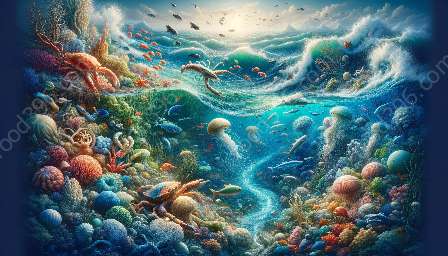When it comes to the intricate web of life in the ocean, coral reef ecology plays a crucial role. Coral reefs are not only a wonder to behold, but they also have a significant impact on oceanography, seafood production, and seafood science. In this comprehensive guide, we will delve into the fascinating world of coral reef ecology and its connections to oceanography and seafood production.
The Importance of Coral Reefs
Coral reefs are often referred to as the rainforests of the sea, and for good reason. They are teeming with a vast array of marine life, providing habitat and sustenance for countless species. From tiny plankton to massive sharks, coral reefs support a diverse and dynamic ecosystem. Not only do coral reefs support biodiversity, but they also offer valuable ecosystem services such as coastal protection, nutrient recycling, and tourism revenue. In addition, they play a significant role in carbon and nitrogen cycling, making them essential for maintaining the balance of the marine environment.
Ecological Interactions on Coral Reefs
The ecological interactions on coral reefs are complex and fascinating. From the symbiotic relationship between corals and algae to the intricate food web involving predators and prey, coral reef ecosystems are a symphony of life and interdependence. The delicate balance of these interactions can be disrupted by environmental stressors, such as rising sea temperatures, ocean acidification, and pollution. Understanding these ecological interactions is essential for comprehending the resilience of coral reefs and the impact of human activities on their well-being.
Coral Reefs and Oceanography
Coral reefs are intimately linked to the field of oceanography, the study of the physical and biological aspects of the ocean. The structure and dynamics of coral reefs influence local oceanographic processes, such as water circulation, wave energy dissipation, and sediment transport. Additionally, coral reefs serve as valuable indicators of ocean health and can provide crucial data for understanding global patterns of ocean circulation and climate change. By examining the relationship between coral reefs and oceanography, scientists can gain insights into the intricate connections between biological and physical processes in the marine environment.
Impacts of Coral Reefs on Seafood Production
Coral reefs are vital for sustainable seafood production, supporting the life cycles of many commercially important fish and invertebrate species. The intricate structure of coral reefs provides habitat for juvenile fish, offering protection from predators and abundant food sources. Additionally, the high productivity and diversity of coral reef ecosystems contribute to the overall abundance of seafood in surrounding waters. However, the degradation of coral reefs due to overfishing, habitat destruction, and climate change poses a significant threat to seafood production, highlighting the interconnectedness of coral reef ecology and the seafood industry.
The Science of Seafood
Seafood science encompasses a wide range of disciplines, including marine biology, fisheries management, food safety, and aquaculture. Understanding the ecological principles underlying seafood production is essential for maintaining sustainable fisheries and aquaculture operations. By integrating knowledge from coral reef ecology and oceanography, seafood scientists can develop effective strategies for conserving marine resources and minimizing the environmental impact of seafood production. Furthermore, seafood science plays a crucial role in ensuring the safety and quality of seafood products for consumers, addressing concerns related to contaminants, pathogens, and nutritional value.
Challenges and Opportunities
As we navigate the intricate connections between coral reef ecology, oceanography, and seafood production, it becomes evident that the health of coral reefs is paramount for sustaining marine ecosystems and seafood resources. Despite the challenges posed by climate change and human activities, there are opportunities for conservation and restoration through innovative research, policy interventions, and community engagement. By fostering a deeper understanding of these interconnected systems and their vulnerabilities, we can work towards a more sustainable future for the oceans and the seafood industry.

